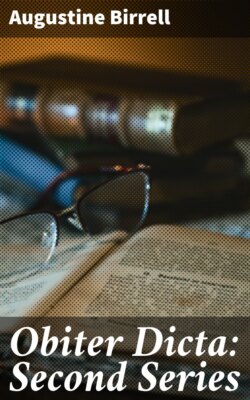Obiter Dicta: Second Series

Реклама. ООО «ЛитРес», ИНН: 7719571260.
Оглавление
Birrell Augustine. Obiter Dicta: Second Series
Obiter Dicta: Second Series
Table of Contents
PREFACE
JOHN MILTON
POPE
DR. JOHNSON
EDMUND BURKE
THE MUSE OF HISTORY
CHARLES LAMB. [204]
EMERSON
THE OFFICE OF LITERATURE
WORN-OUT TYPES
CAMBRIDGE AND THE POETS
BOOK-BUYING
Footnotes:
Отрывок из книги
Augustine Birrell
Published by Good Press, 2019
.....
Mrs. Milton had four children, three of whom, all daughters, lived to grow up. The mother died in childbirth in 1652, being then twenty-six years of age.
The Areopagitica, a Speech for Unlicensed Printing, followed the divorce pamphlet, but it also fell upon deaf ears. Of all religious sects the Presbyterians, who were then dominant, are perhaps the least likely to forego the privilege of interference in the affairs of others. Instead of the Archbishop of Canterbury and the Bishop of London, instead of ‘a lordly Imprimatur, one from Lambeth House, another from the west end of Paul’s,’ there was appointed a commission of twenty Presbyterians to act as State Licensers. Then was Milton’s soul stirred within him to a noble rage. His was a threefold protest—as a citizen of a State he fondly hoped had been free, as an author, and as a reader. As a citizen he protested against so unnecessary and improper an interference. It is not, he cried, ‘the unfrocking of a priest, the unmitring of a bishop, that will make us a happy nation,’ but the practice of virtue, and virtue means freedom to choose. Milton was a manly politician, and detested with his whole soul grandmotherly legislation. ‘He who is not trusted with his own actions, his drift not being known to be evil, and standing to the hazard of law and penalty, has no great argument to think himself reputed in the commonwealth wherein he was born, for other than a fool or a foreigner.’ ‘They are not skilful considerers of human things who imagine to remove sin by removing the matter of sin.’ ‘And were I the chooser, a dram of well-doing should be preferred before many times as much the forcible hindrance of evil doing.’ These are texts upon which sermons, not inapplicable to our own day, might be preached. Milton has made our first parent so peculiarly his own, that any observations of his about Adam are interesting. ‘Many there be that complain of Divine Providence for suffering Adam to transgress. Foolish tongues! When God gave him reason He gave him freedom to choose, for reason is but choosing; he had been else a mere artificial Adam. We ourselves esteem not of that obedience a love or gift which is of force. God therefore left him free, set before him a provoking object ever almost in his eyes; herein consisted his merit, herein the right of his reward, the praise of his abstinence.’ So that according to Milton even Eden was a state of trial. As an author, Milton’s protest has great force. ‘And what if the author shall be one so copious of fancy as to have many things well worth the adding come into his mind after licensing, while the book is yet under the press, which not seldom happens to the best and diligentest writers, and that perhaps a dozen times in one book? The printer dares not go beyond his licensed copy. So often then must the author trudge to his leave-giver that those his new insertions may be viewed, and many a jaunt will be made ere that licenser—for it must be the same man—can either be found, or found at leisure; meanwhile either the press must stand still, which is no small damage, or the author lose his accuratest thoughts, and send forth the book worse than he made it, which to a diligent writer is the greatest melancholy and vexation that can befall.’
.....